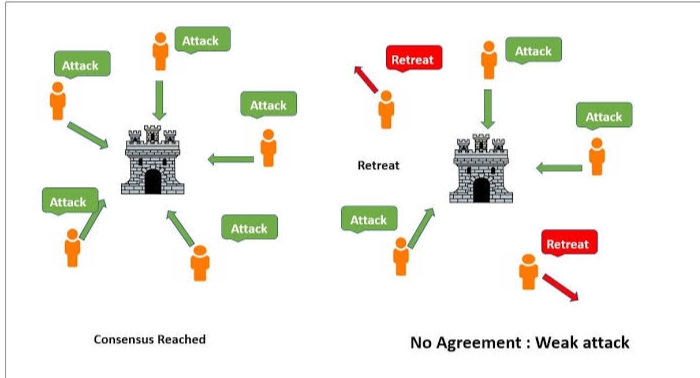
The concept of a "Byzantine Fault" originates from the field of distributed computing and fault-tolerant systems. It is named after the Byzantine Generals' Problem, which is a theoretical scenario where a group of generals, each commanding a portion of the Byzantine army, must coordinate their attack or retreat strategy against a common enemy. The challenge arises due to the potential presence of traitorous generals who may send conflicting messages, leading to a breakdown of communication and coordination.
In the context of computer science and distributed systems, the Byzantine Fault is an issue that arises when components or nodes in a distributed network can behave maliciously or arbitrarily fail. This can cause the system to exhibit unexpected or incorrect behavior, hindering its ability to reach consensus or make reliable decisions.
The key characteristics of a Byzantine Fault include:
Malicious Behavior: Some nodes in the network may act dishonestly by sending contradictory or false information to other nodes, which can lead to misinformation or confusion.
Arbitrary Failures: Nodes can fail arbitrarily, which means they may stop responding or produce unpredictable results, impacting the overall system's stability and reliability.
Lack of Global Clock: The lack of a global clock in distributed systems makes it challenging to determine the exact order of events, exacerbating the complexities of dealing with Byzantine Faults.
Addressing Byzantine Faults requires the use of Byzantine Fault Tolerant (BFT) algorithms and consensus protocols. These algorithms are designed to allow a distributed system to function correctly and reach agreement, even when some nodes behave maliciously or fail. Examples of such algorithms include Practical Byzantine Fault Tolerance (PBFT), HoneyBadgerBFT, and Tendermint.
BFT algorithms typically involve multiple rounds of communication and voting among the nodes in the network to determine the most commonly agreed-upon value or decision. By establishing a threshold for the number of correct nodes needed to achieve consensus, these algorithms can mitigate the impact of Byzantine nodes.
The practical application of Byzantine Fault Tolerance is crucial in various industries, particularly in blockchain technology, where decentralized networks require reliable consensus mechanisms to maintain the integrity and security of the distributed ledger. Byzantine Fault Tolerance enables these networks to withstand attacks and maintain functionality even when some nodes act maliciously or experience failures.
Overall, the concept of the Byzantine Fault and its solutions in the form of Byzantine Fault Tolerant algorithms play a vital role in ensuring the robustness and reliability of distributed systems, enabling them to function effectively in the face of malicious or unpredictable behavior.